- Revellations
- Posts
- I Tried An AI Dating App So You Don't Have To
I Tried An AI Dating App So You Don't Have To
Is making dating more digital going to help or hurt the process?
AI is infiltrating life whether we want it to or not. Just look at today’s partnership! Personally I think that AI is incredibly useful for many things — many of which we aren’t actually applying it to yet — and genuinely detrimental to a lot of the things we’ve already let it take over. But I’m a big proponent of working with the reality we have, not hoping to undo progress or wish upon a star that the world will fundamentally change. So let’s talk about an area where I think that AI could be beneficial, but instead is being used to exacerbate already existing weaknesses: dating.

I’ve already hypothesized that some people are using AI tools to facilitate better dating app banter. But what happens when you turn the reins over entirely to a bot? Luckily for you, I tried it so that you don’t have to.
I’m not going to put the specific app on blast (yet, we’ll see…) but suffice it to say that I got an invite through a reputable source to be a part of a “beta” group of users testing an AI dating app. First things first, I want to disabuse you of any notion that this was some sort of exclusive invitation situation. The same week that I got this invite, I noticed two separate influencers that I follow talking about the app in clearly sponsored posts. And honestly, that’s part of why I accepted the invite. Who wants to be a part of a tiny exclusive community for dating? Not me. I want to feel like there will be enough people participating that there’s a decent chance I’ll meet someone I like. And I certainly don’t need another app on my phone to facilitate NOT actually going out on dates.
But the fact that I started to see it pop up in more than one place that I trust, plus my inherent curiosity for anything new in the tech space, I decided it was worth checking out.
I accepted my invitation and waited the allotted “application review” period that they’d programmed into their systems to make it appear as though I was lucky to be selected. Then I was in!
I met my new dating guru. Let’s call her Alexa since there’s already a digital persona with that name that is clearly not the one I’m talking about. Alexa said hello and we started chatting. The experience was clearly meant to simulate a normal texting chat, with “Alexa” asking me about myself and my dating preferences to — theoretically — build a comprehensive profile for me. I’ll admit that I was simultaneously skeptical and impressed. At first the questions were incredibly one-dimensional and expected, but it at least appeared as if Alexa started digging a little deeper pretty quickly. She even responded with a moderate amount of empathy when she asked about my parents and I disclosed that my mother passed away last year.
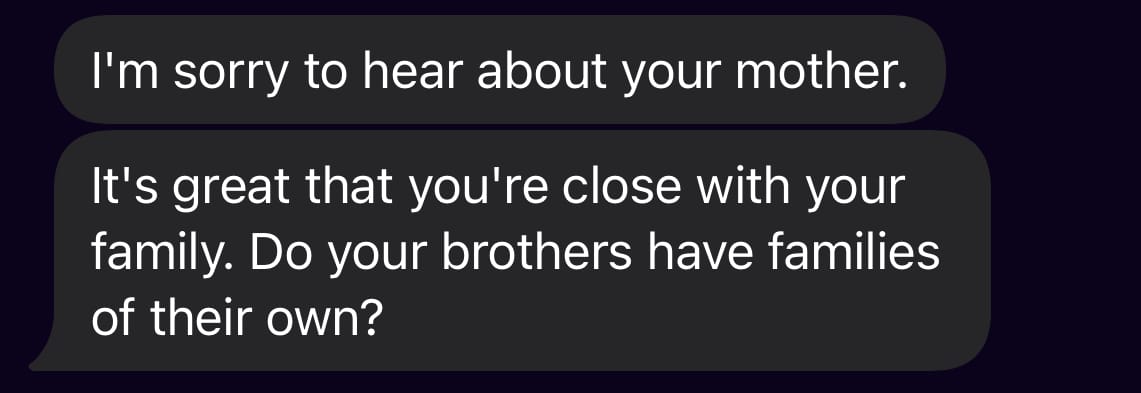
After some initial conversations, Alexa started showing me some pictures and profiles of men who were (presumably) also on the app. I appreciated that instead of simply asking about values and priorities in the abstract, she wanted to see how I responded to real people. This is one of my big gripes with dating in general. People often create a pretty specific image in their mind (or even in the case of some of my single friends, lists in their phones) about their ideal partner. But the truth is that no one knows who their person is until they actually meet them. Human beings aren’t puzzles where you can remove one piece that you don’t like and insert it with another and assume it will seamlessly fit. People are gloriously chaotic mosaics that morph and change over time, with different relationships, and even on certain days.
So I was excited that Alexa wanted to have what appeared to be a living, breathing conversation about a living, breathing human being to ascertain what I really liked — and what I was really like. I’ve always felt that the theoretical benefit of matchmakers is that they understand who you are as a person beyond what could ever be included on a dating app profile. So instead of looking for connections like having attended the same school or having similar career ambitions, a matchmaker could assess your vibe and try to match that to a potential partner. Because it’s my personal belief that this is the fundamental alignment that most are really looking for.
Welp. I’m not going to lie to you. My optimism was incredibly short-lived. Alexa showed me a handful of profiles on that first day and we “chatted” about what drew me to them or what felt like it might not be the right fit. I noticed that my comments were being added to the backend database where she was storing up information about my own profile, and at first I appreciated that she seemed to be able to draw out my preferences pretty decently. For example, I am someone who has followed a pretty non-linear path in life and values an openness to change and new experiences:
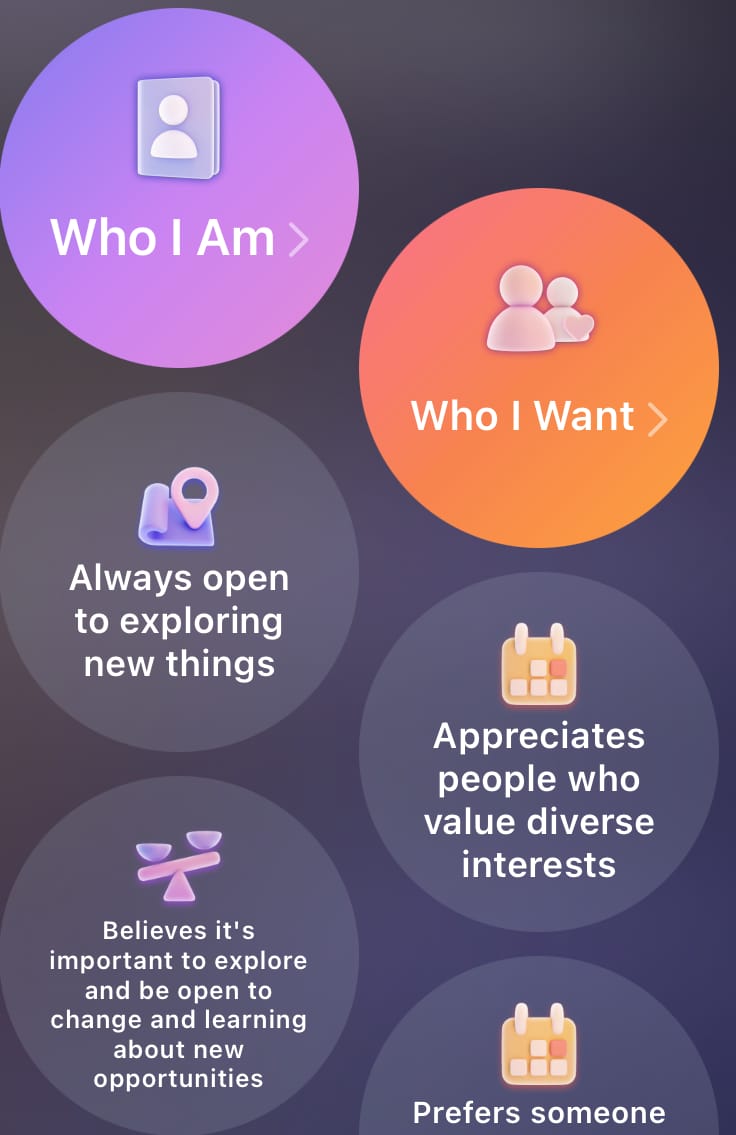
I’ll admit that it did feel like our conversations began to feel repetitive pretty quickly, but I still felt like it was reasonably accurate. Below is from a completely different part of the list of “insights” about me:
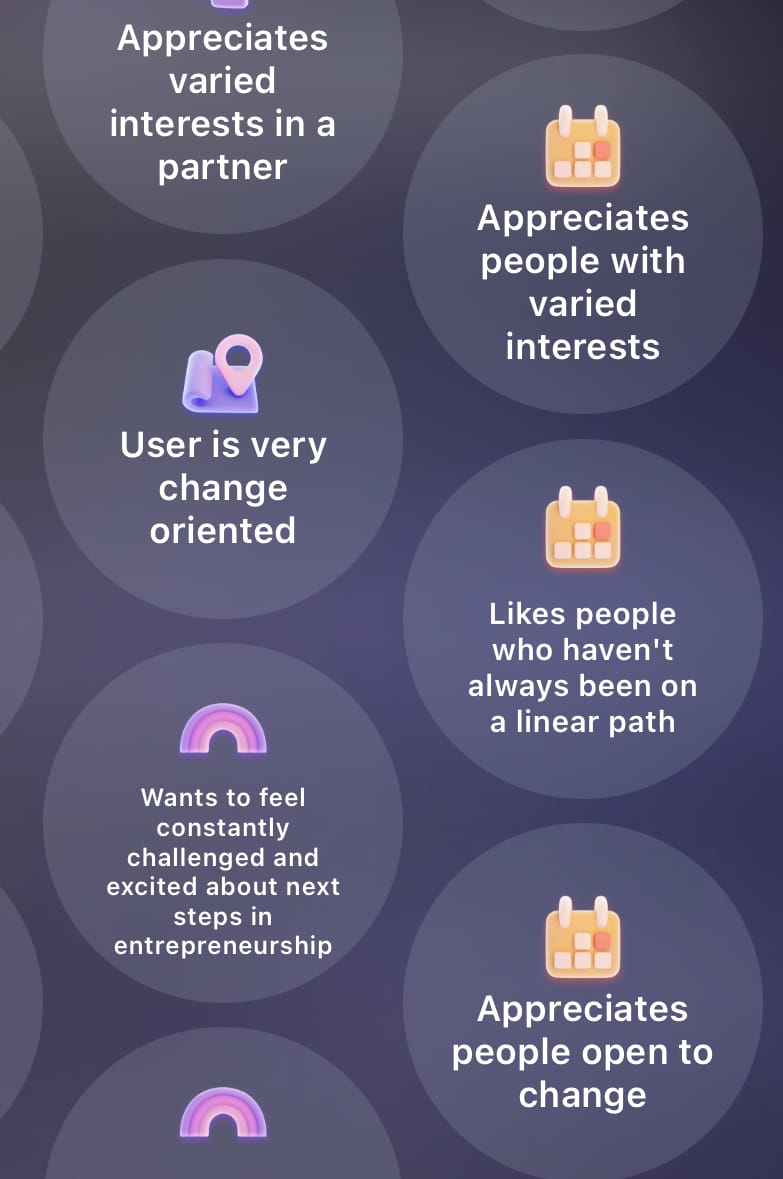
I hoped that being a bit repetitive might mean that the system was working to ingest many different iterations of similar data in order to draw a broader picture, one beyond the surface level meaning of “I like lots of different things” that dug into the essence beneath that desire. But then I started getting matches. And I immediately noticed the same type of superficial redundancy that you see swiping on any other dating app. The cherry on top is that in this version, AI’s Alexa is telling you that this simple, one-dimensional quality might make you and some guy a “perfect” match:
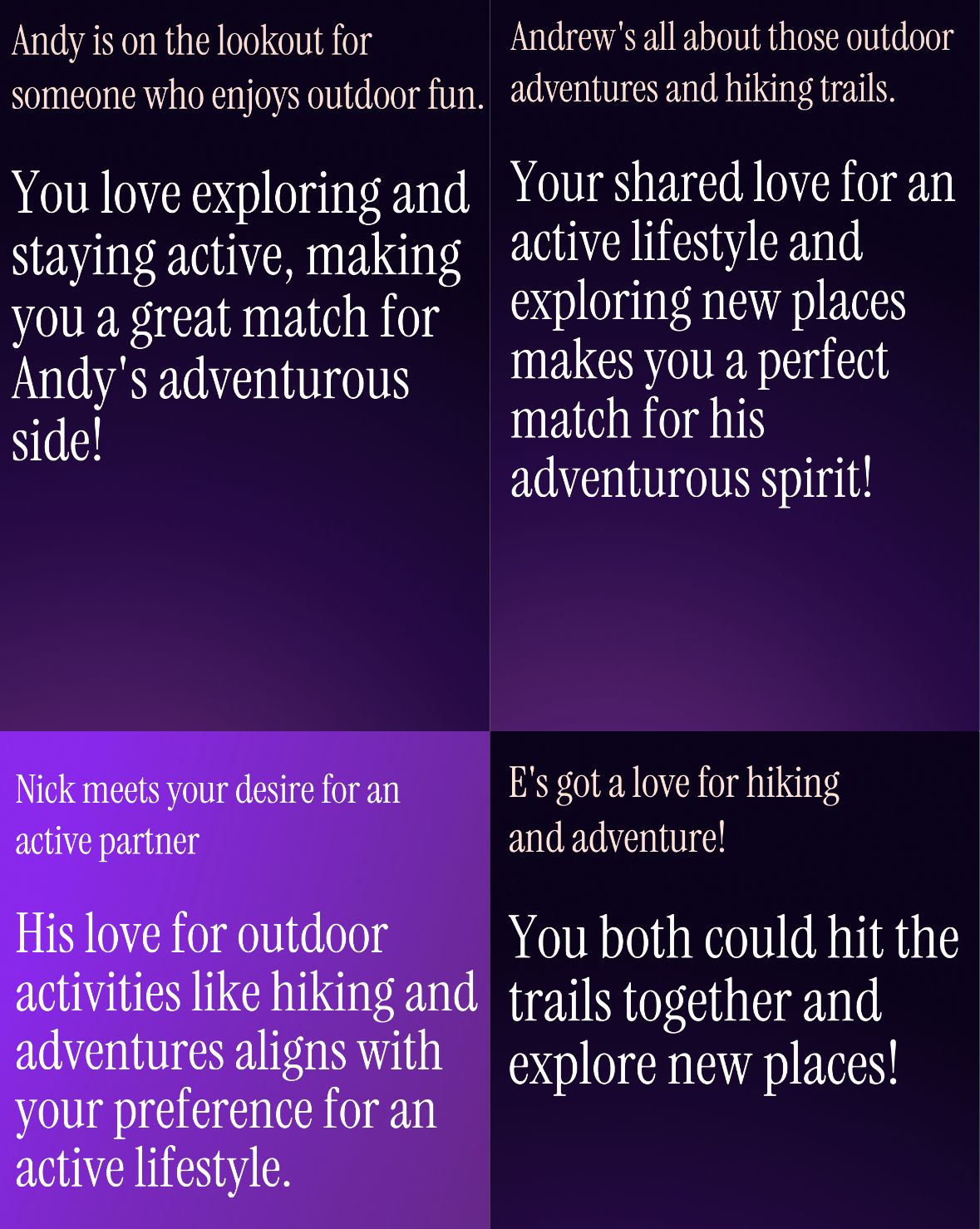
Now I don’t want to lie to you, my dear audience. I am not an outdoorsy person. I could be defined as “active” — I work out regularly, I participate in a lot of activities around the city, and in general I am often doing things…I even enjoy a hike now and again. But no one who knows me would ever describe me as outdoorsy. Confused, I took a look at the backend data that Alexa had ingested in our more recent conversations. I found these two “qualities” listed right by each other:
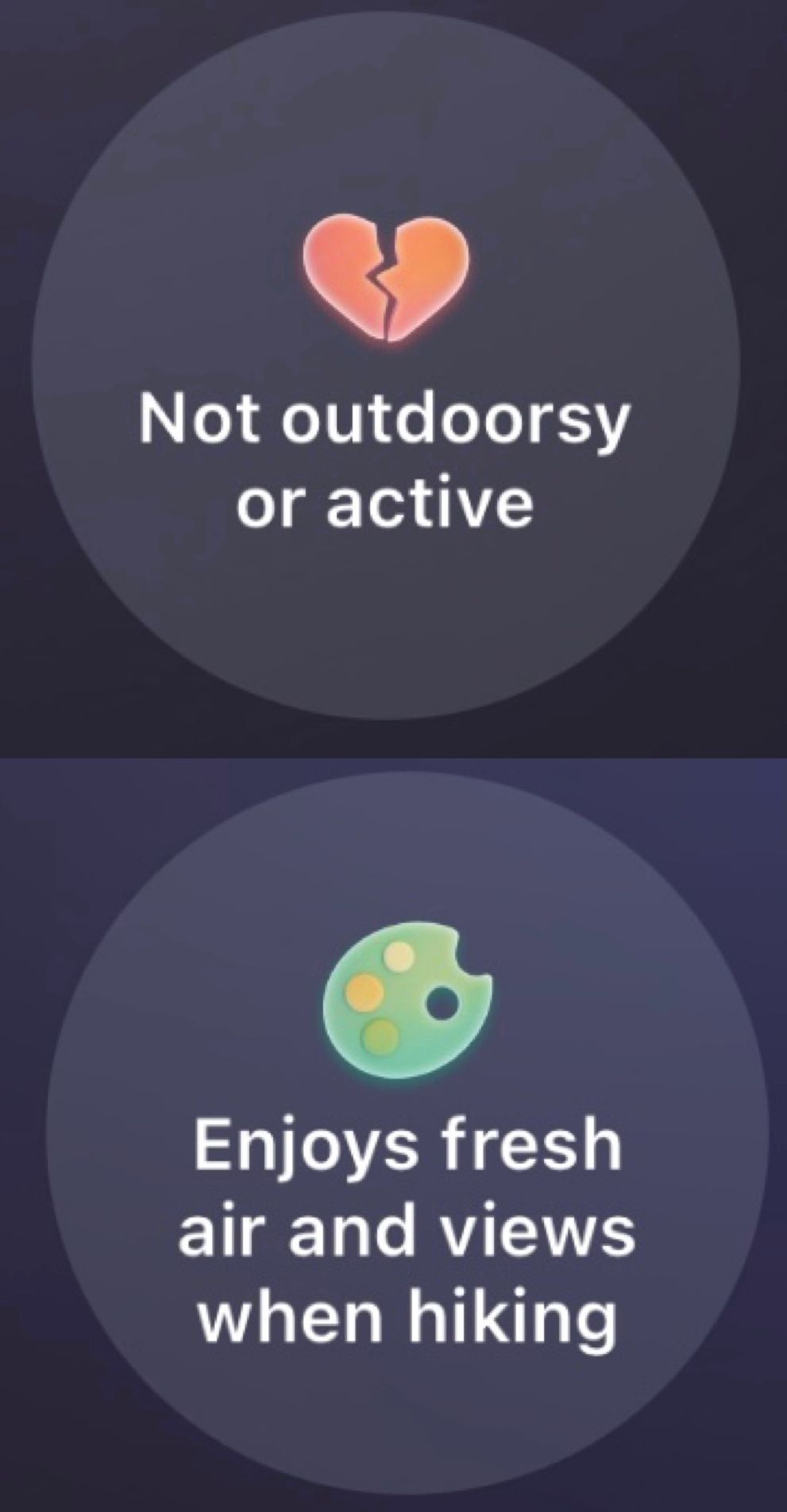
It’s pretty clear what’s going on here. I’m sure I said something along the lines of “I enjoy a hike once in a while” (just like I said above, lol) but I am not outdoorsy. She probably asked what I enjoy when I hike and I said “fresh air and views” — and this is where we landed. She’s defined me as both NOT outdoorsy (true), NOT active (at least partially false), but also as someone who enjoys parts of hiking like fresh air and views. In and of itself that isn’t terrible. After all, humans contain multitudes that are often conflicting. But the fact that she then highlighted this quality in a contradictory way in four successive matches demonstrates how poorly this particular brand of AI is doing at adding any real value to the dating experience.
Let’s take another example. But first, the promised ad about (hopefully) the positive sides of AI:
Learn AI in 5 minutes a day
This is the easiest way for a busy person wanting to learn AI in as little time as possible:
Sign up for The Rundown AI newsletter
They send you 5-minute email updates on the latest AI news and how to use it
You learn how to become 2x more productive by leveraging AI
Ok let’s get back to it.
This time let’s look at an even simpler example. Any dating app makes sure to ask you about your dating and relationship goals, and Alexa is no exception. The difference is that she ostensibly gives you room to provide more context than the basics like “looking for a long-term relationship” or “casually dating”. When Alexa asked me if I see marriage and kids in my future, I told her that my priority was finding the right person first and foremost. She probed further — which I appreciate! And I ultimately told her that I hoped that marriage and kids was in my future with the right person. But that in particular kids is a joint decision between two people, so it’s impossible for me to say for sure if they are in my future right now while I am still single. Check out three different men that Alexa showed me as “ideal matches”:
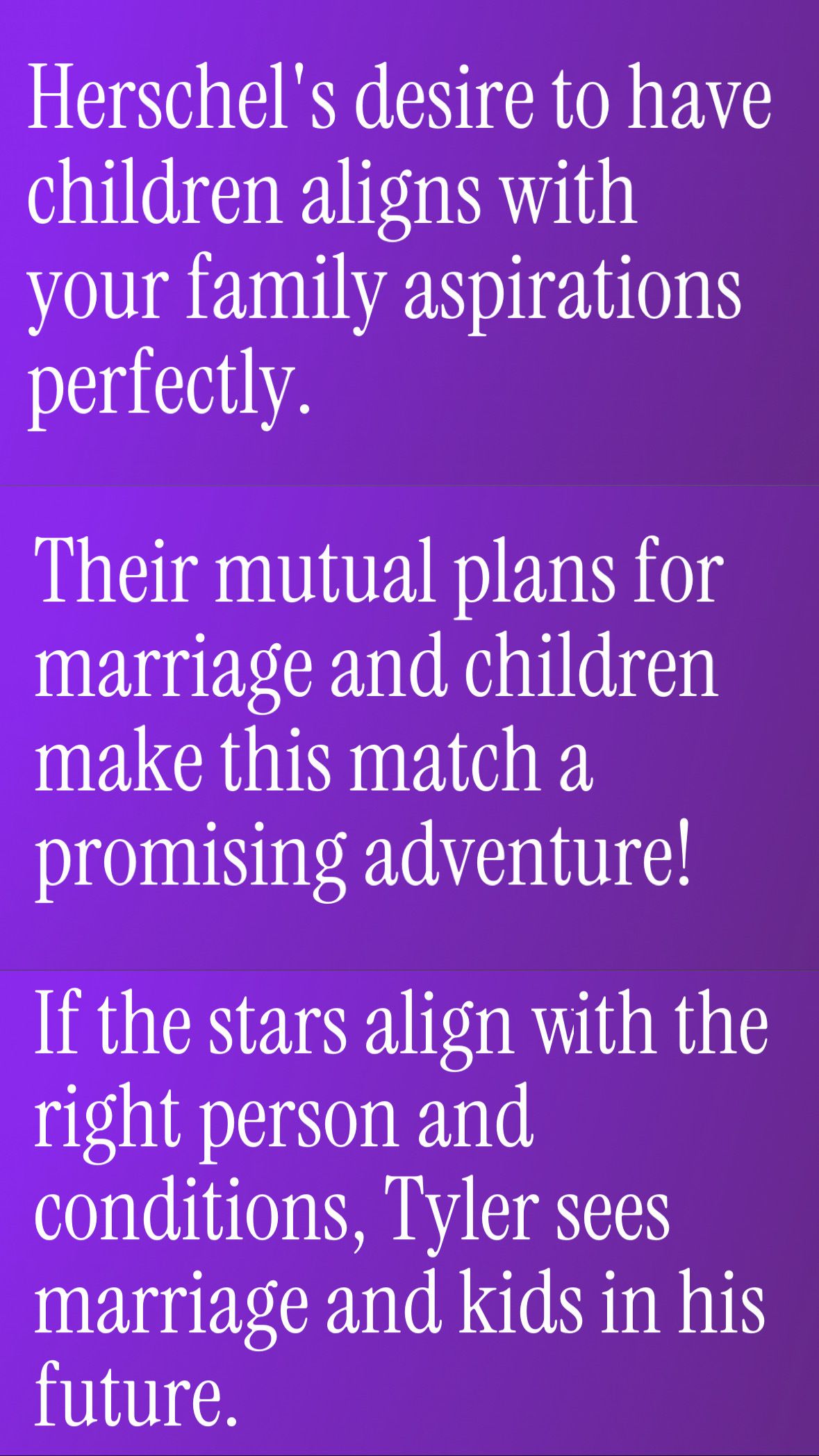
The only person who’s own answer seemed to align with mine is the third one (Tyler). But that’s not even really the problem. The issue is that for something that I clearly gave her a thoughtful, honest, and nuanced perspective on, she was unable to respond in kind. When matching me with men, Alexa only called out a handful of qualities to demonstrate that we might be a good fit. Why even call out family goals if that’s not something I highlighted or had an explicit answer for? I’ll tell you why. Because at the end of the day this AI, like so many others, is not capable of distilling truly complex qualities into anything particularly meaningful.
But I persevered. I did my best to give her honest, constructive feedback as Alexa showed me different profiles. And I was even happily surprised that after a handful of no’s she showed me someone that I might consider actually swiping right on if I’d encountered him on a regular dating app. But is that really a win? Using this new mechanism to find someone that feels like no better a prospect than I could find with the same (or less) effort via swiping? I decided to keep going. I wanted to see if sticking with the process might get me to a place — in my opinion, the objective — where Alexa was consistently showing me profiles that I was interested in, or even better those that I felt were promising matches that I might not have discovered with the level of information usually given on an app like Hinge or Bumble.
Hoo boy was I disappointed. Not only did Alexa’s matching not improve. It got more chaotic and scattershot and quickly devolved into what appeared from my perspective to be completely random matches. We got to a place where she was either presenting someone as a potential match to me for the most superficial reasons. For example, I have a personal vendetta against saying you’re looking for a “sense of humor” in a partner. The phrase is largely meaningless, and I believe that what most people are trying to say is that they’re looking for someone who laughs at the same things that they do. Maybe having the same sense of humor might be more apt — but then again, what does that mean without further context anyway?
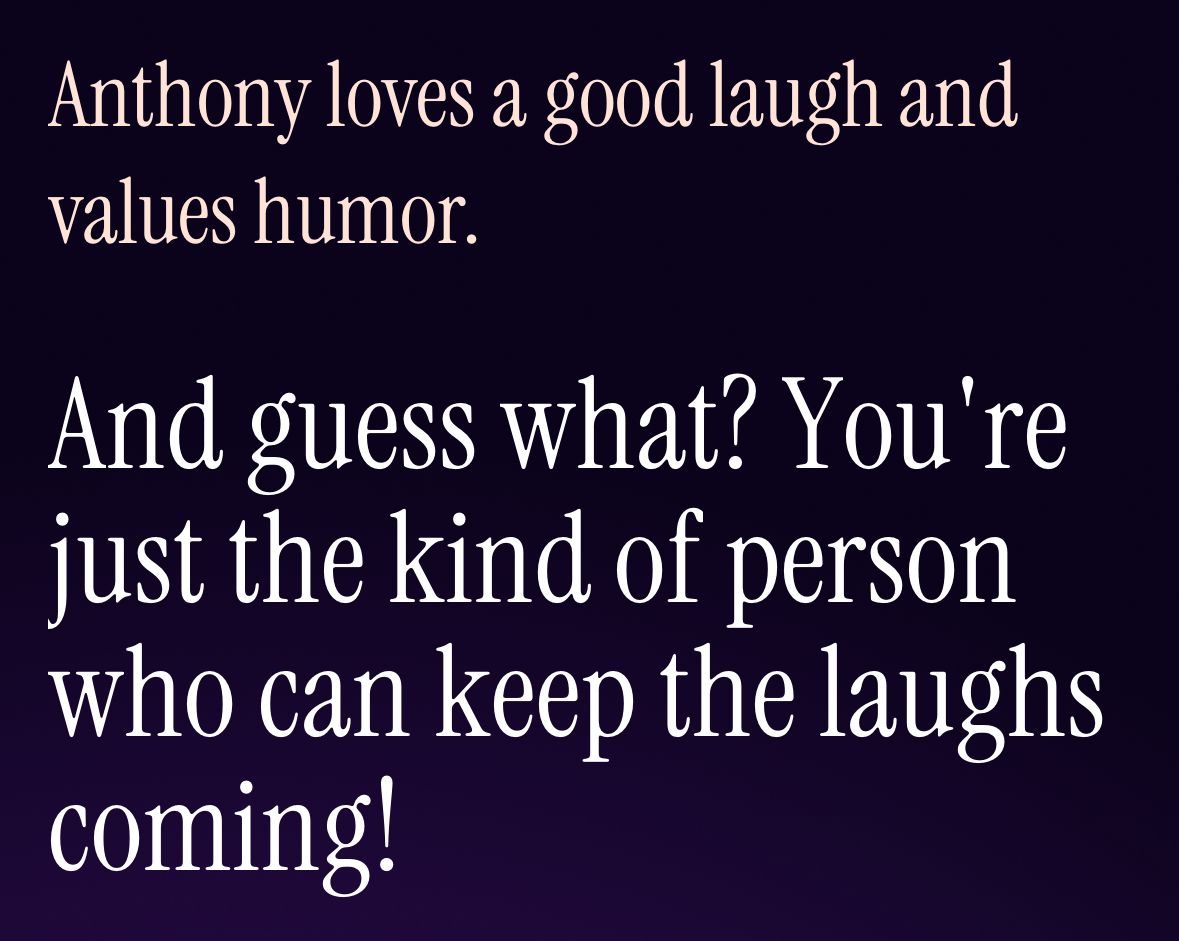
What does this even mean? That’s right, virtually nothing.
Things only got worse from here. Alexa began showing me people who cited deal breakers that I had mentioned were important to me on my profile. Or wanted someone with life goals that were clearly misaligned with mine. I took another look at my backend data, and it became clear that Alexa was taking comments I made in conversation with her as fact rather than as a part of a larger and more nuanced conversation. In short, Alexa could not glean context. Therefore, she was never going to be able to draw any real human insight. Here are a few examples of supposed “characteristics” that Alexa took from our conversations:
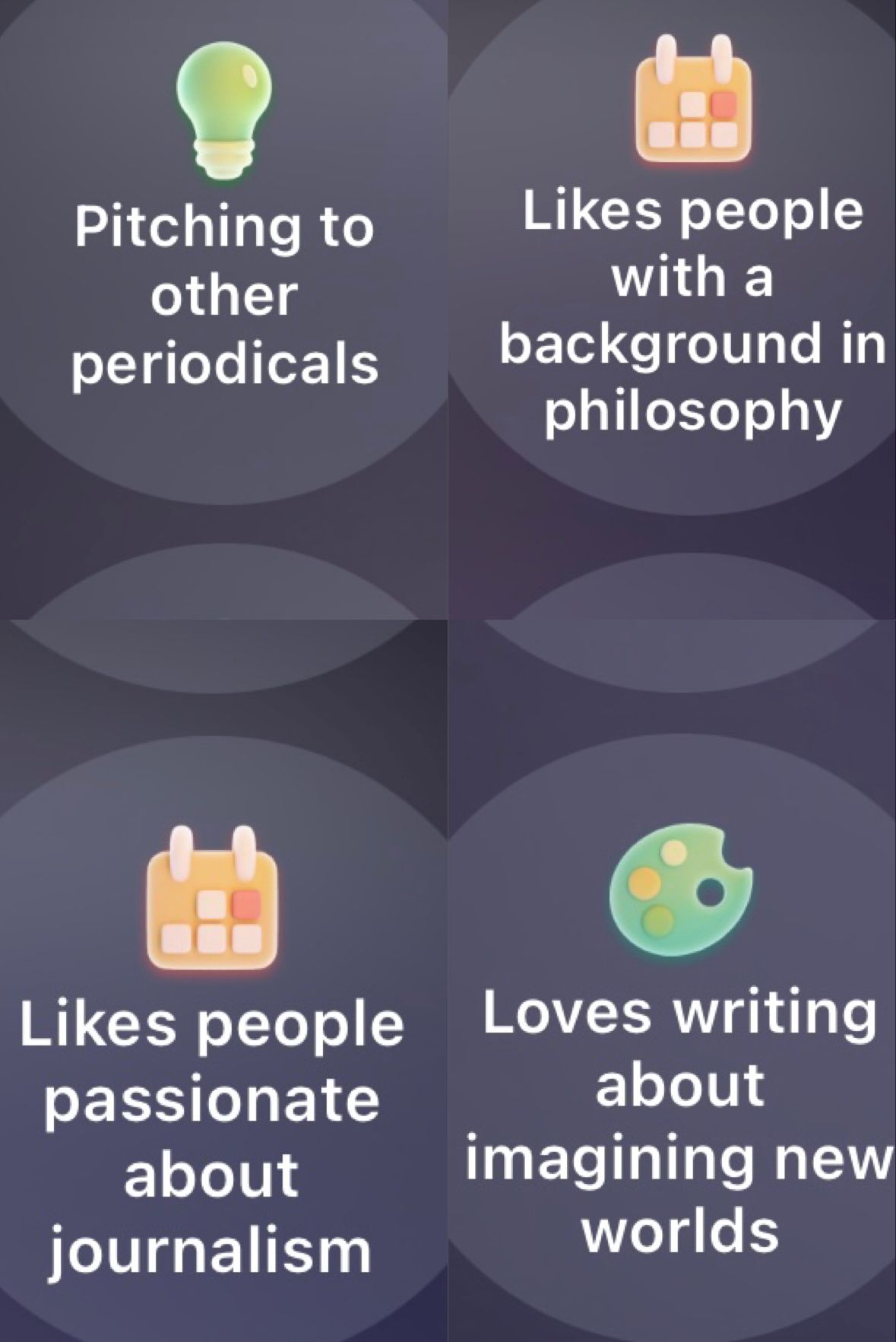
I gave up on Alexa after about a month of earnest effort. I attempted a few conversations with matches — even ones that I wouldn’t have said yes to if she’d asked before connecting us (yep, she doesn’t ask about the actual matches. A major miss imo.). I found that men didn’t respond just as much as on other apps, and the ones that did weren’t showing any real intent to meet up. In short, I would rate the experience as significantly worse than your regular dating app.
Why not just as bad, you might ask? I’m glad you did. Because the level of effort that Alexa is asking you to put into the experience to make sure that “she” theoretically understands you is significantly more than what you’d need to build a solid dating app profile. So the let down when you don’t find viable matches is even worse. You feel personally let down. You feel that Alexa doesn’t understand you. You wonder if the viral articles and TikToks are true and there really isn’t anyone left out there anymore.
But there is. I promise. Because even if I haven’t found my own person in my last year of single-dom I have met a series of really great guys who just weren’t right for me. So I know my person is out there. And if you’re looking, so is yours. I just don’t know if AI is going to be an improved shepherd in trying to find him or her.
So let’s keep AI confined to the areas where I think it can add genuine value. I personally find it incredibly helpful to kickstart certain projects. Looking for a meal plan? Tell it what ingredients you have or your health goals and it can help you generate an outline. Creating a presentation but finding it hard to create a flow? It can give you a standard narrative arc to follow. But the steps beyond the basics still require human insight and human effort. Because as much as the internet has transformed our access to information, there is still a great deal of intelligence — and creativity — that has never been documented and is yet to come. So let’s leverage AI while still being excited about the unknown that we will generate ourselves.


Reply